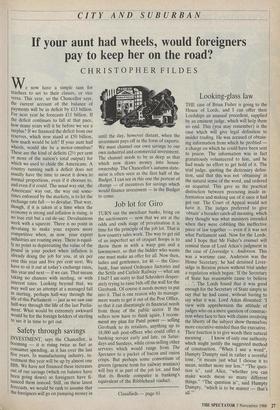CITY AND SUBURBAN
If your aunt had wheels, would foreigners pay to keep her on the road?
CHRISTOPHER FILDES
We now have a simple sum for teachers to set to their classes, or vice versa. This year, so the Chancellor says, the current account of the balance of Payments will be in deficit by £13 billion. For next year he forecasts £11 billion. If the deficit continues to fall at that pace, how many years will it be before we see a surplus? If we financed the deficit from our reserves, which now stand at £50 billion, how much would be left? If your aunt had wheels, would she be a motor-omnibus? These are the kind of deficits (21/2 per cent or more of the nation's total output) for which we used to chide the Americans. A country running such a deficit does not usually have the time to sweat it down to normal proportions, even if it chooses to, and even if it could. The usual way out, the Americans' way out, the way out some- times enforced by the markets, is to let the exchange rate fall — to devalue. That way, though, if it is taken at a time when the economy is strong and inflation is rising, is no true exit but a cul-de-sac. Devaluations work with a squeeze. There is no point in devaluing to make your exports more competitive when, as now, your export industries are roaring away. There is equal- ly no point in depreciating the value of the Pound in your pocket when inflation is already doing the job for you, at six per cent this year and five per cent next. We have to sit it out at today's exchange rates, this year and next — if we can. That means taking no chances with sterling, or with interest rates. Looking beyond that, we may well see an attempt at a managed fall in sterling, perhaps half-way through the life of this Parliament — just as we saw one half-way through the life of the last Parlia- ment. What would be extremely awkward would be for the foreign holders of sterling to see it in time to get out.


































































 Previous page
Previous page